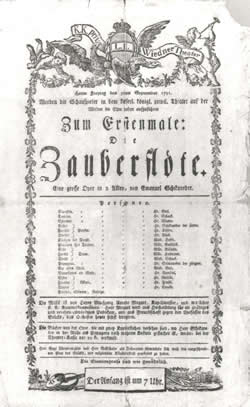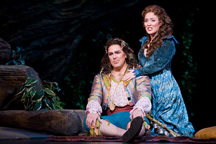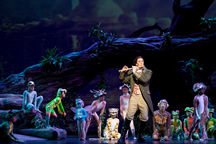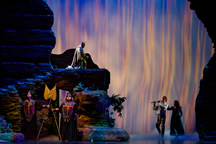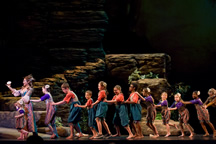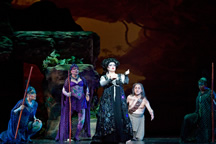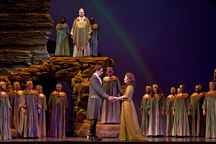Opera Review
“The Magic Flute”
Science vs. Superstition
by Aaron Yule
April 2011
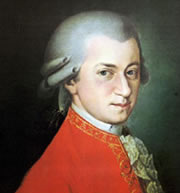 Wolfgang Amadeus Mozart |
|
The Magic Flute (Die Zauberflöte) |
The following is a report in consequence of reviewing a recent performance of Mozart's Die Zauberflöte (The Magic Flute) at the Detroit Opera House on Friday April 15, 2011.
Critics Review
It is generally thought that when someone writes a review for an opera or the like, he must endeavor to either give a rosy wreath of praise to an individual’s majestic voice or scour them for their ungraceful performance; but I find such practice a rather ungodly act of self-satisfaction for the critics themselves. When talking of the wonderful performance of the Magic Flute Friday evening, instead of pontificating over what was seen, I'd rather spend my thoughts giving praise to that which caused its emanation, that which brought forth its being! What more satisfaction can Stephen Lord or any conductor [1] receive then to know that we heard and did praise the indefatigable spirit of Mozart last Friday evening; to know that within a decent English translation and so-so (to be polite) stage setting a heavenly spirit was presented to us.
Would that not gratify the singers also? I could talk about how the singers sung marvelously or even criticize Ava Pine (Pamina)[2] as lacking in tears as much as Michael Mayes (Papageno) gained in laughs, but what good would come of it? Each individual singer, whether it be the wondrous deepness of Peter Lobart (Sarastro)[3] or the fleeting integrity of the Aline Kutan (Queen of the Night ), would never compare to the power of the mind of the composer! It is the work itself which we must understand, always improve, and always keep within in our minds; for we, whether singer, instrumentalist, or ordinary citizen, praise the creator: Wolfgang Amadeus Mozart.
Therefore instead of indulging your spirits in the praises of critical satisfaction, (Critics beware!) I would rather enjoy laying before you some of my thoughts, including this verse, concerning the intention of Mozart's last opera and the subject of the discussion: Die Zauberflöte!
Divine and wondrous spirit of Eternity,
Thine herald of the Muses,
Whose harmonies have glorified the Creator,
and preserved our sacred rights
as Man: truly, honestly and dearly;
Give us thy sacred offering!
In Time We Find Repose
Schikaneder could play a Hamlet or a Papageno, each as well as the other, and knew that it was not the actor who earned the gratitude but the composition. The most important of those compositions he worked diligently on with his companion Mozart was the Magic Flute, which they developed as an integrated whole having all its parts move the mind of the audience from conflict into resolution into discord and then completion. It was not the nice harmonies and enjoyable rhythms which were important, but the creation of a moral concept, both in the poetry and in the music. In order to accomplish this act, they had to contrast the science of truth, as was understood by the working of Ben Franklin, from that of the occult; from that of the superstitious!
It is most ridiculous to associate Mozart with magic. He joined the Freemason lodge of Baron Otto von Gemmingen who closely worked with Benjamin Franklin on advancing metallurgy and many other sciences, and also set up the “Magazine for Science and Art.” [4]
Mesmerized by Superstition
The hand of superstition fits well the glove of pleasure!
Any society that wishes to adhere to the dogma of Adam Smith's theory of moral sentiments, that our goal is to avoid pain and seek personal sensual pleasure, is a society which lacks the moral fitness to survive. This fact is well known amongst the spies of Empire, whether they be Venetian like Austro-Hungarian secret police or modern Brutish MI6 agents, each agent knows how to use pleasure to obtain someone’s destruction and temporary use. The Cardinal de Rohan of France was driven by his pleasure into believing the magical powers of the Count Cagliostro, which drew the Cardinal to the center of intrigue respecting the Necklace affair. Emperor Joseph II sought refuge in a peasant girl and was swayed under prince Kaunitz into a war with the Turks. And Bill Clinton was soiled by a dress, which swayed him to repeal Glass-Steagall giving rise to a Bush.
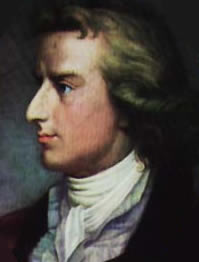 Friedrich Schiller |
Schiller warned of these intrigues in his adapted translation of the French play “The Parasite,” written in 1803:
“This time, merit has gained victory.--But it is not always so. The web of deception entangles the good, the honest are unable to succeed, servile mediocrity advances further than true talent: Appearance rules the world—and justice is found only on the stage.” [5]
In their Così fan Tutti, which Mozart created with the fleeing Da Ponte of Venice, they explicitly attack the superstitious, pleasure-seeking fanaticism of the Vienna court by “bringing back the dead” in the hilarious revival of the two Arabian princes by way of Mesmer's magical magnetic stones, after having “poisoned” themselves to gain Venus' sword. This Mesmer, whom Mozart and Da Ponte justly make fun of, had been frequent in attendance at the court of Empress Maria Theresa, creating fake revivals of the blind and other such magical tricks. Mesmer, along with others, helped foster the superstitious thoughts of the Empress and the court to the point that the Empress for a time was unwilling to use the small pox vaccine which Van Sweiten, her physician, had insisted be put into practice. The reluctance to use the vaccine caused several of her children and the first wife of Joseph II to die of smallpox: Is she Empress, Queen or superstitious woman? Maybe all three. Therefore beware of a wives tale! For Prince, it comes for you!
“Zu Helfe, Zu Helfe!”
|
Mozart's Magic Flute |
Theater as a Moral Institution
I am saddened by the prospect that there is a lack of morality in the general culture of our United States today which we daily find ourselves struggling against. Is it not surprising therefore to find the corrupted actions of politicians and others when the majority of the people of the United States have never heard Mozart? How many young boys die in Detroit due to drug related and other crimes? To think that this city used to be the center of some of the greatest voices of opera! Today it is a shanty town of shifting trash and broken, abandoned buildings; a dying metropolis. It is amazing that the Opera house still exists amongst the growing rubble. Will it last forever? Not if the nation is destroyed. Think about the evil of shutting down half the schools of Detroit, turning class rooms into playpens, instead of learning centers; are these schools to be the center of raising monkeys or human beings? How many of these poor kids will come to enjoy the beauty of their own mind? How many will enjoy Mozart? When we hear the beating pulse of the boom boom bang rapper outside the Opera hall, do we cringe and say nothing is to be done or do we give reason to save the nation? If something isn't done this once glorious city of Detroit might soon be only an opera hall!
Therefore it is your duty as a moral individual, whether singer, director or ordinary citizen to save the souls of our dying nation from the budget cutting mayhem of Obama and a crazed Governor Snyder. What is the theater if its moral commitment is to earn a few more years of production? [6] Will the theater soon be for the rich only as it was only for the nobility in Austria until the reign of Mozart's patron Joseph II? Have we not learned from Schiller and Lessing about the necessary enlightenment of the people, by means of establishing national theaters for all citizens? I think Joseph II did:
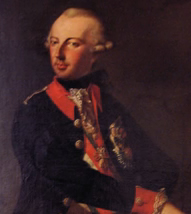 Emperor Joseph II |
“The great of the world ought to be especially grateful to the stage, for it is here alone that they hear the truth.
“Not only man’s mind, but also his intellectual culture, has been promoted by the higher drama. The lofty mind and the ardent patriot have often used the stage to spread enlightenment.
“Considering nations and ages, the thinker sees the masses enchained by opinion and cut off by adversity from happiness; truth only lights up a few minds, who perhaps have to acquire it by the trials of a lifetime. How can the wise ruler put these within the reach of his nation?
“The thoughtful and the worthier section of the people diffuse the light of wisdom over the masses through the stage. Purer and better principles and motives issue from the stage and circulate through society; the night of barbarism and superstition vanishes. I would mention two glorious fruits of the higher class of dramas. Religious toleration has latterly become universal. Before Nathan the Jew and Saladin the Saracen put us to shame, and showed that resignation to God’s will did not depend on a fancied belief of his nature, --even before Joseph II. Contended with the hatred of a narrow piety,--the stage had sown seeds of humanity and gentleness: pictures of fanaticism had taught a hatred of intolerance, and Christianity, seeing itself in this awful mirror, washed off its stains. It is to be hoped that the stage will equally combat mistaken systems of education. This is a subject of the first political importance, and yet none is so left to private whims and caprice. The stage might give stirring examples of mistaken education, and lead parents to juster, better views of the subject. Many teachers are led astray by false views, and methods are often artificial and fatal.
“Opinions about governments and classes might be reformed by the stage. Legislation could thus justify itself by foreign symbols, and silence doubtful aspersions without offense.
“Now, if poets would be patriotic they could do much on the stage to forward invention and industry. A standing theater would be a material advantage to a nation it would have a great influence on the national temper and mind by helping the nation to agree in opinions and inclinations. The stage alone can do this, because it commands all human knowledge, exhausts all positions, illumines all hearts, unites all classes, and makes its way to the heart and understanding by the most popular channels.
“If one feature characterized all dramas; if the poets were allied in aim, --that is, if they selected well and from national topics,--there would be a national stage, and we should become a nation. It was this that knit the Greeks so strongly together, and this gave them the all-absorbing interest in the republic and the advancement of humanity.”[7]
How from Heaven a Mozart Was Sent!
Johannes Kepler struggled through the evils of the Thirty Years War, losing many relatives and friends to the devastation of the inhumanity which the Austro-Hungarian Empire and most of Europe had been at the time. During his lifetime he developed a keen insight, and with all the insanity around him, accomplished the most august act: he stole fire from the heavens and captured the warring Mars, whose unsettled spirit raged anomalous in the heavens. Having fettered Mars in the chains of an ellipse he unlocked the key to the heavenly harmonies, which the Supreme and almighty used to establish the System of those orbs of heavenly motion and intrigue. This most august act cracked the superstitious sycophants of religion, burst the hallow minds of logic, and severed the shackles of Promethean man; and to think it accomplished in the most horrifying of times!
Once the key had been discovered and the door opened, the world needed only that which would fulfill and construct His image:
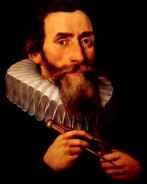 Johannes Kepler |
“Now there is need, Urania, of a grander sound, while I ascend by the harmonic stair of the celestial motions to higher things, where the true archetype of the fabric of the world is laid up and preserved. Follow me, modern musicians, and attribute it to your arts, unknown to antiquity: in these last centuries, Nature, always prodigal of herself, has at last brought forth, after an incubation of twice a thousand years, you, the first true offprints of the universal whole. By your harmonizing of various voices, and through your ears, she has whispered of herself, as she is in her innermost bosom, to the human mind, most beloved daughter of God the Creator.”
“Shall I be committing a crime if I demand some ingenious motet from individual composers of this age for this declaration? The royal psalter and the other sacred books will be able to supply a suitable text for it. Yet take note that no more than six parts are in harmony in the heaven. For the Moon warbles her solo independently, attending the Earth as at a cradle. Compare the symbols: in making the book, I promise to be a zealous overseer of the six parts. If anyone expresses more closely the heavenly music described in this work, to him Clio pledges a wreath, Urania pledges Venus as his bride.”[8]
And who was to be Venus' groom? Who was to Glorify the realm of Urania in all its splendor? A student of the endearing Kepler: Johannes Sebastian Bach! He who would transform a royal theme into a heavenly musical offering and assemble the harmonies of heaven into worldly four and six part fugues. Thus as Kepler unlocked the door, J.S. Bach gave all Mankind access to its splendor and showed them the way out of superstition into composition; substance!
Now it was from this heavenly prospect that our dear Mozart did set foot upon our world, coming through an open door to educate and let the world know that the way of truth had been opened further and should not be feared; for the moral testimony was given (Ave Maria Virgine!) and all should follow its ways. A testimony with a clear path: out from the dogma and superstition into the light of reason must we struggle: thus it is here, within the domain of enlightenment, we find the truly Magic Flute!
In Conclusion
All criticisms of an actor are less important then the social context of the actors participation. If a society becomes less and less inclined to understand the sublime, and more and more reduces its outlook to immediate gratification, how much can we blame an actor for the inability to express genuine emotion when emotion is false in society; when the people are fearful of their own existence? Therefore, we all hold a duty to reach beyond our comforts, whether in communicating an ideal, as in the Magic Flute, or in securing political and economic freedom for all our citizens. Thus to ensure mankind avoids the prospects of extinction, we must take off the gloves of superstition and wash our hands of private vice so as to send Man into space and the lying superstitiously evil mystics of science, like the recently unearthed Robert Geller,[9] to the trash bins of history!
Footnotes
[1]. Conductor Stephen Lord has a good sense of humor, as was heard in many of the musical transitions between acts, but also in the overture which was rather provocative.
[2]. Shakespeare’s play King Lear, although a tragedy, is a powerful comedy also. It brings together the most crucial elements of human emotion and thought to engage the audience and show them the faults within society and themselves. Mozart and Schikaneder's opera also has these elements: both comedy and potential tragedy. Therefore, Pamina is tragic but for the intervention of the three spirits. In great drama we should cry just as well as laugh.
[3]. Naturally I prefer the German over the English translation as I'm sure Mr. Lobart would too.
[4]. See Mozart and the American Revolutionary Upsurge by David Shavin FIDELIO Magazine, Vol. 1, No. 4, Winter, 1992
[5]. Friedrich Schiller “Poet of Freedom” Schiller Institute vol.II pg 250
[6]. Will Ford Motor company exist forever? I wouldn't rely on it.
[7]. Aesthetical and Philosophical Essays of Schiller Vol.II pg.58-59 Edited Nathan Haskell Dole copyright 1902 no.109
[8]. The Harmony of the World, Johannes Kepler. Translated E.J.Aiton, A.M.Duncan, J.V.Field, copyright 1997
[9]. Robert Geller, considered a leading voice in statistical random earthquake occurrence, is typical of the disgusting creatures which are used to falsify knowledge and frighten mankind with extinction. He would assert that earthquakes are unforeseeable and goes about stopping others from investigating earthquake precursors; a truly evil intent.
Related pages:

